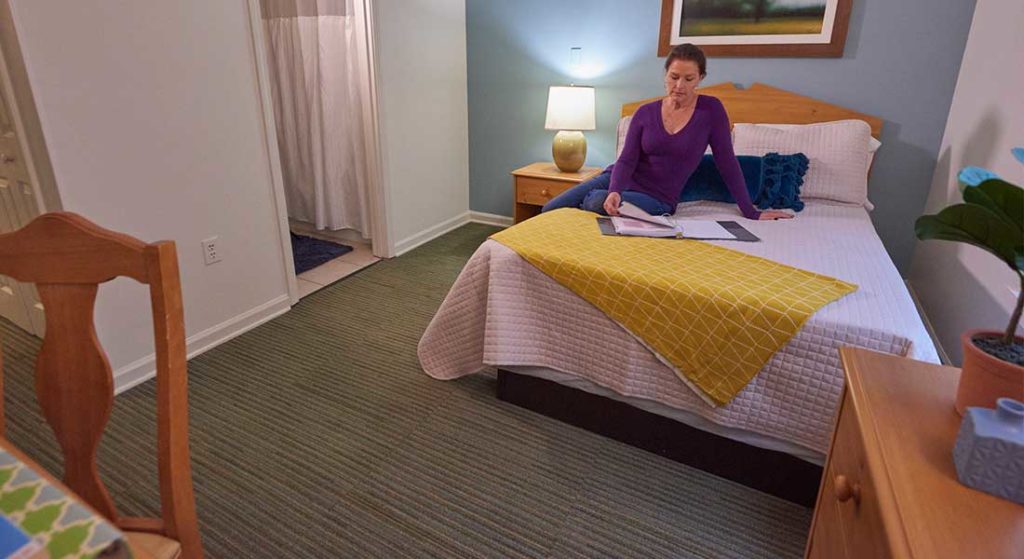How to Choose the Right Level of Psychiatric Treatment
Finding the right level of psychiatric treatment can make the difference between recovering and getting stuck in the cycle of your symptoms. There are many factors that will determine what kind of treatment is best for you. If you’re having a hard time with anxiety, but can still get yourself to go to work or school, an outpatient program may be right for you. However, if you find even the most basic tasks difficult, you may need a more intensive program like day treatment, or a residential stay. Read on to discover some of the key differences between treatment options, and how to determine which one may be right for you.
What is outpatient therapy?
Outpatient is the least intensive and most common form of psychiatric treatment. Clients participating in outpatient therapy have regularly scheduled office appointments with a therapist, counselor, psychologist, or psychiatrist.
Those who are self-motivated, have mild to moderate mental illness symptoms, can ask for and receive help from a strong support network, and are able to function outside of the treatment environment often do well in an outpatient therapy setting. Outpatient therapy may be a good “maintenance” level of care to help someone stay healthy after completing a more intensive psychiatric treatment program. Outpatient therapy may also be helpful if you are trying to navigate a stressful situation or major transition, such as a divorce, death of a loved one, traumatic experience, becoming a parent, or experiencing physical pain or a medical illness.

Clients participating in outpatient therapy have regularly scheduled office appointments with a therapist, counselor, psychologist, or psychiatrist.
Most patients meet with a mental health professional for 1-2 hours on a weekly, biweekly, or monthly basis. Clients may see multiple mental health professionals on an outpatient basis. For example, you might visit a psychiatrist monthly for medication management and a therapist weekly for talk therapy.
Different therapists focus on different treatment approaches or modalities, such as cognitive behavioral therapy, dialectical behavior therapy, acceptance and commitment therapy, interpersonal psychotherapy, motivational enhancement therapy, conflict resolution therapy, etc. Some therapists work with individuals, while others specialize in couples counseling or family therapy. A good patient-therapist relationship is crucial to making progress, so clients often try out a few different therapists before finding someone who is a good fit.
Outpatient therapy also comes in the form of group sessions. Many people who share similar issues will get together and help each other out with the issues each of them face from day to day. Those who struggle with addiction, depression, grief, or eating disorders often find group therapy sessions helpful, as they can connect with others who are going through similar problems and feel less alone in their struggles.
What is a day treatment program?
Day treatment is the next step up from outpatient care, but a step down from residential treatment. Day treatment program also are called partial hospitalization programs or PHP. In most mental health day treatment programs, you spend several hours each day at the treatment facility. Those seeking day treatment therapy do not stay overnight; they return to their homes at the end of each day. Psychiatric day treatment programs are time limited, and most clients participate for a few weeks to a few months.

Day treatment is the next step up from outpatient care. Day treatment programs are time limited, and most clients participate for a few weeks to a few months.
Day treatment programs are best for those who need more intervention than traditional outpatient therapy, but who aren’t experiencing such severe symptoms that they need to be monitored on a regular basis. More frequent meetings with a psychiatrist can help solidify an effective medication strategy. Daily therapeutic sessions help clients focus on developing the skills needed to cope with stress, improve mood, address disruptive or harmful behavior patterns, and participate more fully in their communities. The daily structure of mental health day treatment programs may help clients hit a “reset” button, especially if they have started isolating at home, avoiding friends or family, sleeping too little or too much, or developing unhealthy eating patterns.
Clients participate in Skyland Trail’s day treatment program from 10 am to 4 pm each weekday and engage in activities like individual counseling, group therapy and expressive therapies customized to specific illnesses. Patients receive practical classroom education about their mental health diagnosis: what does it mean to have depression, bipolar disorder, or anxiety? They learn skills to help them cope with difficult people or situations. And clients find ways to use their strengths, passions and supportive relationships to stay healthy despite periodic episodes of depression or symptoms of anxiety.
What is a residential treatment program?
Residential treatment programs usually last a few weeks to a few months and involve staying at the facility as a resident. Psychiatric residential treatment often is a safe next step for someone leaving an inpatient hospital or acute care facility after a crisis. Residential treatment also can be helpful for someone experiencing their first episode of a mental illness such as depression, bipolar disorder, or schizophrenia, or for someone who has struggled with symptoms for many years but now finds those symptoms overwhelming.

Residential treatment often is a safe next step for someone leaving an inpatient hospital or acute care facility after a crisis.
Residential treatment centers may be locked or unlocked facilities. Most offer 24/7 supervision and care. Licensing varies from state to state, but clients should look for licensing or accreditation from an independent organization like the Joint Commission or the Commission on Accreditation of Rehabilitation Facilities.
Residential treatment facilities for mental health or addiction give patients a structured environment in which they can step away from day-to-day responsibilities and the demands of a job, school or family, and focus on their recovery. Clients receive counseling and therapeutic support through a daily schedule of individual and group activities, but also have access to additional support as needed if they experience distress.
Many clients may have neglected basic self-care while dealing with the overwhelming impact of mental illness. As part of residential treatment they re-learn healthy habits like personal hygiene, healthy eating, and consistent sleep patterns. After being so focused on what makes you feel “bad” and what you don’t like about yourself or your life, residential programs help you identify what makes you feel good, your personal strengths, and the positive aspects of your life. Individual and group therapy sessions help you build strategies to leverage those positive assets to stay healthy. As part of a residential community, clients also learn about taking responsibility for their behavior since it affects others. And many clients report that being with a group of people going through a similar struggle makes them feel less isolated and alone.
Learning new skills involves repetition and practice. Residential treatment programs provide a longer length of stay for clients to focus on learning and adopting the skills they need to stay healthy and prevent crises and repeat hospitalizations.
Many times, family members or supportive friends are involved in residential treatment. They often learn techniques to help them support and understand what their loved one is going through.
When would someone admit to a hospital or inpatient psychiatric unit?
Inpatient hospitals are for those who are experiencing extreme mental distress, including those who are suffering from severe suicidal thoughts or psychosis and require constant medical supervision. Most people who admit to an inpatient hospital are those who are no longer able to care for themselves or those whose behavior presents a risk to themselves or others. Patients may admit voluntarily or may be enrolled involuntarily by family members, a healthcare professional, or law enforcement.
Hospitalization is the most intensive level of mental health care and is really intended to help patients stabilize and reach a point where they are no longer suicidal or psychotic. Most hospital stays are short: a few days to a few weeks. Additional care – often residential treatment or day treatment – is recommended after a stay in an inpatient hospital.
Transitions in Level of Care
Gradually transitioning from inpatient care to residential or day treatment, and then to outpatient therapy helps individuals receive appropriate support while learning how to live and thrive with a mental illness. A good analogy might be learning to float on your back in the water. At first you need someone to hold you up completely, then maybe just one hand under your back, then hands hovering just beneath you in case you start to sink, then someone beside you smiling and applauding your new skills and independence.
Some transitions may require you to admit to multiple health systems or treatment organizations. Other mental health treatment organizations offer a continuum of care that allows you to admit to one program and gradually transition between levels of care.
Specialization and Focus
Along with figuring out what level of care would be most helpful to you, you’ll also need to discover what kind of treatment facility is most in line with your diagnoses and goals. Some mental health facilities focus on addiction and recovery from alcohol and substance use. Others are primary psychiatric for mood, thought and anxiety disorders. Some have hybrid “dual diagnosis” programs to help you treat both.
Still other mental health programs may specialize in diagnoses including eating disorders, personality disorders, trauma, autism spectrum disorders, or compulsive disorders. Some programs may specialize based on gender, age, or even profession. Some programs offer a single therapeutic approach and apply it to all patients, regardless of diagnoses or symptoms. Others offer a more tailored, individualized approach.
Mental Health Treatment at Skyland Trail
Skyland Trail in Atlanta offers a number of evidence-based mental health treatment programs – from residential treatment to outpatient programs – to help you learn to live and thrive with your mental illness. Get in touch with our admissions team to find out which of our treatment options works best for your needs.
